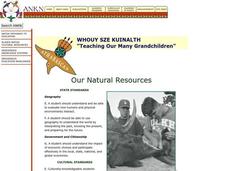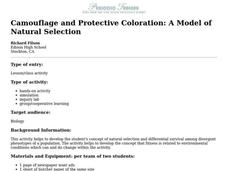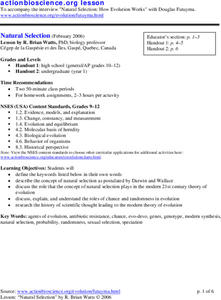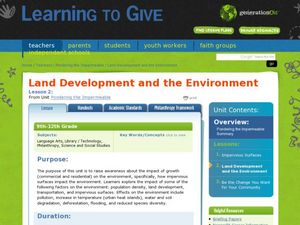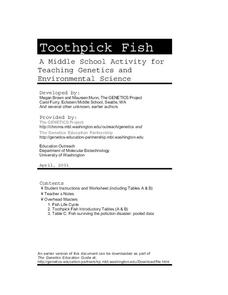Curated OER
Who Gets Eaten? A Study of Natural Selection
Fourth graders represent a new predator on a population of colored worms. They mathematically determine the effect of the new predator on the survival and reproductive rates of the worms, simulating natural selection at work.
Curated OER
Sustainable Development and Canada's Natural Resources
Students use text information, data and graphs to explain what sustainable development is, and to investigate the rate of consumption of Canada's natural resources. In groups, they graph their findings.
Curated OER
Human Activity and the Environment
Students review and analyze graphs and tables as a group. They develop their graph and data analysis skills by converting data tables from Human Activity and the Environment into graphs.
Curated OER
Mother Nature Pattern Maker
Young scholars in a teacher education program enhance their awareness of patterns. They discover how to support their students in developing this skill in mathematical terms. They role play the role of a K-2 student and collect images...
Curated OER
If I Was A...? Mother Nature
In this environment worksheet, students pretend they are Mother Nature as they answer 4 questions. They explain whether their temperature gets hotter with a fever, why the Ozone layer is leaving them, how big Mother Nature is compared to...
Curated OER
Evolution: Natural Selection
Learners analyze and discuss the evolutionary history of dinosaurs. In this investigative lesson students monitor different organisms in the environment and analyze the pressures that affect the chances of survival.
Curated OER
Our Natural Resources
Students discuss key terms used to describe ecosystems and how humans are altering natural resources. They listen to the book, Grandfather's Wisdom, and list the renewable and nonrenewable resources they have used or consumed in the past...
Curated OER
Camouflage and Protective Coloration: A Model of Natural Selection
Students investigate natural selection and differential survival among divergent phenotypes of a population. Using everyday items , they model adaptations of camouflage and protective coloration in two very different environments.They...
Curated OER
Natural Selection
Students use discussion questions, handout information and research topics to explore several issues related to natural selection and evolution. They examine Darwin's research on the finch and antibiotic resistance.
Curated OER
The Natural Selection of Stick-Worms
Students discuss and role-play the elements of natural selection. They use toothpicks to represent Stick-Worms and discover the mechanisms of change of traits in populations.
Curated OER
Natural Resource Awareness
Seventh graders design a collage that shows natural resources or things made from natural resources. They discuss the collages and decide how they use natural resources at home and school. They listen to a read aloud of a Native American...
Curated OER
Our Natural Resources
Students investigate natural resources and man-made items. In this earth science lesson, students classify items from trash into man-made items or natural resources. Students construct a flow chart to investigate the life cycle of a...
Curated OER
Natural resource Race
Second graders answer true or false questions about natural resources. They stand on lines opposite each other and hop toward the middle if they answered the question correctly.
Curated OER
Natural Selection: Exploring the 'Ohi'a Common Garden
Seventh graders examine natural variation by visiting the Ohi'a Common Garden in Volcano, Hawaii. In this natural selection lesson, 7th graders study background information about phenotypes, genotypes, and phenotypic plasticity before...
Curated OER
Land Development and the Environment
Students examine the relationship between land development and the environment. For this environmental stewardship lesson, students explore how population density, land development, transportation, and impervious surfaces take their toll...
Curated OER
Watering Our Prairie Farms
After reading an article about irrigation on Canadian farms, learners participate in a discussion. They individually write an opinion paper about the surrounding issues. A lesson plan like this can be used in an earth science class when...
University of Washington
Toothpick Fish
With colored toothpicks representing genes, youngsters practice passing them through generations of fish and learn about heredity. Consider this as an introductory activity since it does not represent recessive genes with lowercase...
Carnegie Mellon University
Marcellus Shale: Who Pays?
After viewing short clips of unfortunate events, your class will consider two sides of a homeowner's court case, and then learn about the Marcellus shale deposit beneath the state of Pennsylvania and the hydraulic fracturing process. In...
National Geographic
Spot Where You DON'T Get Your Seafood
When your class is examining the fishing industry or sustainable practices, you can use this brief activity to demonstrate the global impact our food choices have. Overharvesting, overfishing, and bycatch are important topics to address...
Curated OER
Detectives in the Landscape
Fourth graders explore landscapes. In this landscape activity, 4th graders investigate different elements of landscapes. Students design a visual presentation using photographs taken during a nature walk.
Curated OER
Taking Count of Biodiversity
Here is a well-designed lesson plan on biodiversity that should intrigue your charges. In it, pupils compare a natural desert area to a school field to see how habitat destruction affects species diversity. Groups set up transects and...
Indian Land Tenure Foundation
Relationships to Places
Young historians take a look at how the Indian tribes of California promoted a mindful relationship between people and the land. They begin to understand how the Indians were champions of conservation, and at preserving the natural...
Virginia Department of Education
Changes in Ecosystems
How does water pollution affect the environment? Provide your class with the resources to answer this question as they learn about eutrophication and ecosystem changes. Over two weeks, they simulate the effects of pollution on the...
Channel Islands Film
Natural Resources, and Human Uses of Plants and Animals
As part of their study of the restoration projects on Santa Cruz Island, class members demonstrate their understanding of the connections among plant life, animals, and the actions of humans by crafting a model that reveals these...








